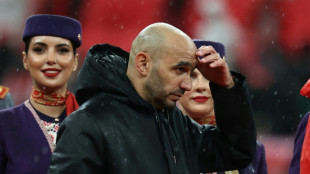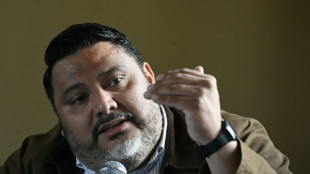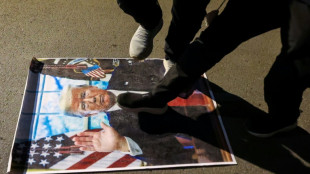-
 Morocco part company with coach Regragui as World Cup looms
Morocco part company with coach Regragui as World Cup looms
-
Lens beat Lyon on penalties to reach French Cup semis

-
 El Salvador's Bukele holding dozens of political prisoners: rights group
El Salvador's Bukele holding dozens of political prisoners: rights group
-
With Iran war, US goes it alone like never before

-
 Spurs slip deeper into relegation trouble after loss to Palace
Spurs slip deeper into relegation trouble after loss to Palace
-
European, US stocks back in sell-off mode as oil prices surge

-
 Pete Hegseth: Trump's Iran war attack dog
Pete Hegseth: Trump's Iran war attack dog
-
Celtics' Tatum could make injury return on Friday

-
 'Enemy at home': Iranian authorities tighten grip as war rages
'Enemy at home': Iranian authorities tighten grip as war rages
-
Bethell set for 'hell of a career', says England captain Brook

-
 France coach Galthie slams Scotland for 'smallest changing room in the world'
France coach Galthie slams Scotland for 'smallest changing room in the world'
-
Medvedev arrives in Indian Wells after being stranded in Dubai

-
 Trump fires homeland security chief Kristi Noem
Trump fires homeland security chief Kristi Noem
-
Mideast war risks pulling more in as conflict boils over

-
 Wales' James Botham 'sledged' by grandfather Ian Botham after Six Nations error
Wales' James Botham 'sledged' by grandfather Ian Botham after Six Nations error
-
India hero Samson eyes 'one more' big knock in T20 World Cup final

-
 Britney Spears detained on suspicion of driving while intoxicated
Britney Spears detained on suspicion of driving while intoxicated
-
Grooming makes Crufts debut as UK dog show widens offer

-
 Townsend insists Scots' focus solely on France not Six Nations title race
Townsend insists Scots' focus solely on France not Six Nations title race
-
UK sends more fighter jets to Gulf: PM

-
 EU to ban plant-based 'bacon' but veggie 'burgers' survive chop
EU to ban plant-based 'bacon' but veggie 'burgers' survive chop
-
Leagues Cup to hold matches in Mexico for first time

-
 India reach T20 World Cup final after England fail in epic chase
India reach T20 World Cup final after England fail in epic chase
-
Conservative Anglicans press opposition to Church's first woman leader

-
 Iran players sing anthem and salute at Women's Asian Cup
Iran players sing anthem and salute at Women's Asian Cup
-
India beat England in high-scoring T20 World Cup semi-final

-
 Mideast war traps 20,000 seafarers, 15,000 cruise passengers in Gulf
Mideast war traps 20,000 seafarers, 15,000 cruise passengers in Gulf
-
Italy bring back Brex to face England

-
 French policeman to be tried over 2023 killing of teen
French policeman to be tried over 2023 killing of teen
-
Oil prices rise, stocks slide as Middle East war stirs supply concerns

-
 More flights take off despite continued fighting in Middle East
More flights take off despite continued fighting in Middle East
-
Ukraine, Russia free 200 POWs each

-
 Middle East war halts work at WHO's Dubai emergency hub
Middle East war halts work at WHO's Dubai emergency hub
-
Paramount's Ellison vows CNN editorial independence

-
 US says attacks on alleged drug boats have spooked traffickers
US says attacks on alleged drug boats have spooked traffickers
-
Dempsey returns as Scotland shuffle pack for Six Nations clash against France

-
 India pile up 253-7 against England in T20 World Cup semi-final
India pile up 253-7 against England in T20 World Cup semi-final
-
Wary Europeans pledge 'defensive' military aid in Mideast war

-
 Seven countries to boycott Paralympics ceremony over Russia: organisers
Seven countries to boycott Paralympics ceremony over Russia: organisers
-
UK's Crufts dog show opens with growing global appeal

-
 PSG prepare for Chelsea clash with Monaco rematch
PSG prepare for Chelsea clash with Monaco rematch
-
Google opens AI centre as Berlin defends US tech reliance

-
 Second Iranian ship nears Sri Lanka after submarine attack
Second Iranian ship nears Sri Lanka after submarine attack
-
Portugal mourns acclaimed writer Antonio Lobo Antunes

-
 Union loses fight against Tesla at German factory
Union loses fight against Tesla at German factory
-
Wales revel in being the underdogs, says skipper Lake

-
 German school students rally against army recruitment drive
German school students rally against army recruitment drive
-
Wary European states pledge military aid for Cyprus, Gulf

-
 Liverpool injuries frustrating Slot in tough season
Liverpool injuries frustrating Slot in tough season
-
Real Madrid will 'keep fighting' in title race, vows Arbeloa

Who wins and who loses in Syria?
In a dramatic turning point for Syria, the Assad regime has collapsed, paving the way for Hay’at Tahrir al-Sham (HTS) to seize the reins of power. This profound shift comes after years of civil war, international intervention, and internal political struggles. While the fall of one government and the rise of another might briefly end large-scale hostilities in certain areas, the implications for Syrians—and regional players—are complex and far-reaching. Below, we examine who stands to benefit from HTS’s ascension and who may face serious setbacks in the aftermath.
Potential Winners
1) Hardline Islamist Groups and Affiliates
As HTS consolidates its influence, other aligned Islamist factions may find opportunities to share in governing structures or expand their influence in regions of Syria. Local militias cooperating with HTS may receive political or financial rewards, as well as a certain degree of autonomy in the territories they help control.
2) Foreign Backers of HTS
Certain external supporters might see political or strategic advantages if their preferred groups are now in charge. These backers could influence the formation of new governmental institutions, policies, or trade agreements favorable to their interests.
3) Some Local Communities Under HTS Control
In areas where HTS had already established local governance—providing basic services and a semblance of stability—residents might see a continuation of order, albeit under strict regulations. While personal freedoms may be curbed, some communities might prefer an end to intense fighting over the chaos of ongoing armed conflict.
Potential Losers
4) Moderate Opposition Groups
Non-extremist factions that fought to topple the Assad regime could be sidelined, if not outright suppressed, by the new leadership. Political competition might be stifled, making it difficult for moderate voices to participate in post-conflict governance.
5) Ethnic and Religious Minorities
With HTS widely considered a hardline faction, minority groups—such as Alawites, Christians, Kurds, and Druze—may face persecution or exclusion from the new power structure. Discriminatory policies could lead to displacement, especially in regions already experiencing sectarian tension.
6) Civil Society and Human Rights Advocates
NGOs, independent journalists, and activists critical of HTS’s ideology may be forced to operate clandestinely or face severe repercussions. Freedom of the press, speech, and assembly could be further curtailed, limiting any meaningful civic engagement.
7) International Humanitarian Efforts
Foreign aid agencies may find it more difficult to operate under a leadership that has been labeled “extremist” by many nations. Bureaucratic hurdles, security risks, and ideological disputes may restrict the distribution of crucial humanitarian assistance to vulnerable populations.
International Dynamics
Regional Powers:
Neighboring countries that once supported specific rebel factions might find their influence diminished if those groups lose ground under HTS rule. Conversely, regional actors that developed covert ties with HTS might gain a stronger foothold in Syria’s evolving political landscape.
Global Powers:
Western nations could face a dilemma: accept a de facto extremist-led government for the sake of stability, or maintain sanctions and diplomatic isolation. Rivalries between larger international players—such as the United States, Russia, and Iran—may shift as each decides how (or whether) to engage with HTS.
Humanitarian Concerns:
While HTS’s political agenda may bring an end to certain forms of internal conflict, Syria still faces severe humanitarian challenges. Millions are displaced, infrastructure is in ruins, and the economy remains fragile. Aid agencies worry that severely restrictive policies or ideological conditions set by the new authorities could hamper reconstruction and limit aid distribution, prolonging the suffering of ordinary Syrians.
Looking Ahead
The end of the Assad regime and the rise of HTS marks a new chapter in Syria’s ongoing struggle. For some, the new government provides a semblance of order after years of civil war. For others, it heralds tighter social controls, greater risk of persecution, and an uncertain future. How HTS manages governance, minority rights, and international relations will ultimately shape Syria’s recovery or further turmoil.
As the global community watches from afar, Syrians remain on the front lines of this dramatic power shift—some hoping for a break from ceaseless conflict, others bracing for a new and possibly harsher form of authoritarian rule. Only time will tell if HTS can stabilize the country and address the nation’s myriad challenges, or if Syria’s years of turmoil will persist under a different banner.

Trump’s 50% tariffs on europe

Reverse Apartheid" in SA?

NYALA Digital Asset AG

Trump’s Crackdown: Lives/Risk

Russia's Population Plummets

Trump's Tariffs Batter Mexico

China vs. Putin and Kim?

Jewish Success: Myths & Facts

Zelensky's trap for Putin

US tariff dispute: No winner

Euro Challenges Dollar's Reign




